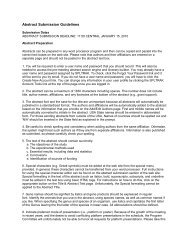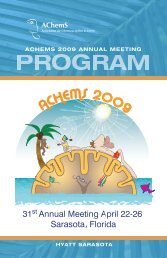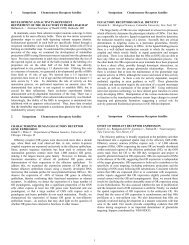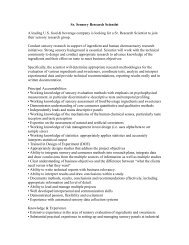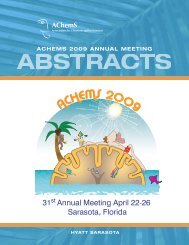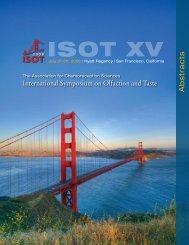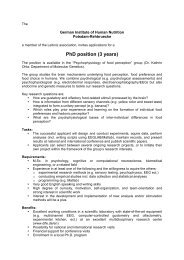Abstracts - Association for Chemoreception Sciences
Abstracts - Association for Chemoreception Sciences
Abstracts - Association for Chemoreception Sciences
You also want an ePaper? Increase the reach of your titles
YUMPU automatically turns print PDFs into web optimized ePapers that Google loves.
#P174 POSTER SESSION IV:<br />
CHEMICAL SIGNALING AND BEHAVIOR;<br />
ANIMAL BEHAVIOR/PSYCHOPHYSICS;<br />
CHEMOSENSATION AND METABOLISM;<br />
VOMERONSASAL AND CHEMICAL<br />
COMMUNICATION<br />
#P175 POSTER SESSION IV:<br />
CHEMICAL SIGNALING AND BEHAVIOR;<br />
ANIMAL BEHAVIOR/PSYCHOPHYSICS;<br />
CHEMOSENSATION AND METABOLISM;<br />
VOMERONSASAL AND CHEMICAL<br />
COMMUNICATION<br />
Odor Identification Per<strong>for</strong>mance in Middle Aged Obese<br />
Individuals with High Blood Pressure<br />
Stephanie M. Oleson 1 , Erin Green 3 , Aaron Jacobson 3 , Claire Murphy 1,2,3<br />
1<br />
San Diego State University San Diego, CA, USA, 2 University of<br />
Cali<strong>for</strong>nia, San Diego San Diego, CA, USA, 3 SDSU-UCSD Joint<br />
Doctoral Program in Clinical Psychology San Diego, CA, USA<br />
Obesity is a major health epidemic that affects people globally<br />
and is associated with the development of serious comorbidities<br />
such as diabetes, hypertension, and heart disease. The presence<br />
of obesity has also been linked to the risk <strong>for</strong> later development<br />
of Alzheimer’s Disease (AD) or mild cognitive impairment<br />
(MCI) and has also been associated with poorer per<strong>for</strong>mance<br />
on cognitive measures of global, executive, and memory<br />
functioning. Furthermore, olfactory functioning is linked to<br />
energy balance and metabolism and has been shown to be<br />
altered in obese individuals, as well as those diagnosed with<br />
AD or MCI. It has been proposed that the impact of obesity on<br />
cognition is indirect and influenced by comorbidities such as<br />
hypertension and diabetes. There<strong>for</strong>e, the current study sought<br />
to determine if odor identification per<strong>for</strong>mance differed between<br />
obese individuals with and without high blood pressure. Thirtyone<br />
obese individuals (BMI > 30 kg/m 2 ) between the ages of<br />
46-54 years old were given the San Diego Odor Identification<br />
test. Obese individuals with high blood pressure per<strong>for</strong>med<br />
significantly worse on the odor identification task ( F= 8.384; p<br />
= .008), but neither group significantly differed in BMI or odor<br />
threshold. The results suggest that obese individuals with high<br />
blood pressure are more likely to show odor memory deficits<br />
and that these changes occur as early as during middle-age.<br />
Acknowledgements: Supported by NIH grant #AG004085-25<br />
to CM.<br />
Effect of Oral Sensations on the Relief of Thirst<br />
Catherine Peyrot des Gachons 1 , Julie Avrillier 2 , Laure Algarra 3 ,<br />
Emi Mura 4 , Paul A.S. Breslin 1,5<br />
1<br />
Monell Chemical Senses Center Philadelphia, PA, USA,<br />
2<br />
AgroSup Dijon Institut National Superieur Dijon, France,<br />
3<br />
AgroParisTech Paris, France, 4 Suntory Business Expert Ltd.<br />
Kawasaki, Japan, 5 Rutgers University Department of Nutritional<br />
<strong>Sciences</strong> New Brunswick, NJ, USA<br />
Thirst is the internal sensation of a need to drink, presumably<br />
to rehydrate or recover bodily fluid losses. But thirst is quenched<br />
long be<strong>for</strong>e all ingested fluids are absorbed. There<strong>for</strong>e, sensory<br />
feedback must play a role in thirst quenching. Different beverages<br />
seem to quench thirst with different efficiencies, but how their<br />
oral sensory characteristics determine the thirst quenching<br />
efficacy is poorly understood. The purpose of this study was to<br />
determine which oral sensation(s) commonly manipulated in<br />
beverages, such as temperature or carbonation, influence levels<br />
of thirst. To answer this question, subjects who were deprived<br />
of liquid overnight were first asked to drink a fixed volume of<br />
an experimental beverage presenting one or two specific traits.<br />
Then we objectively evaluated their residual thirst by measuring<br />
how much additional plain, uncarbonated, room temperature<br />
water they wanted to drink afterwards. The results show that<br />
the perception of coldness is an important parameter <strong>for</strong> thirst<br />
quenching. A beverage at low temperature (5°C) quenches thirst<br />
more than a beverage at room temperature (20°C). Moreover,<br />
a cold, carbonated beverage relieves thirst even more than does<br />
a cold uncarbonated beverage. These results support, in part,<br />
the observations of the sensory controls of thirst quenching in<br />
the animal literature. Acknowledgements: Suntory Business<br />
Expert Ltd.<br />
#P176 PPOSTER SESSION IV:<br />
CHEMICAL SIGNALING AND BEHAVIOR;<br />
ANIMAL BEHAVIOR/PSYCHOPHYSICS;<br />
CHEMOSENSATION AND METABOLISM;<br />
VOMERONSASAL AND CHEMICAL<br />
COMMUNICATION<br />
Intraduodenal infusions of sucrose influence conditioned and<br />
unconditioned affective taste-guided responses to oral sucrose<br />
Lindsey A. Schier, Alan C. Spector<br />
Department of Psychology and Program in Neuroscience,<br />
Florida State University Tallahassee, FL, USA<br />
POSTER PRESENTATIONS<br />
Sensory signals ascending from the oral cavity and viscera are<br />
integrated in the CNS to adjust meal size and taste preferences.<br />
Electrophysiological data suggest such integrations affect early<br />
processing in brainstem taste nuclei. Taste receptors (e.g. T1R)<br />
are also found in GI cells, but whether taste-like signals arising<br />
<strong>Abstracts</strong> are printed as submitted by the author(s).<br />
95



